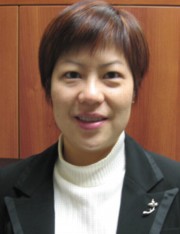Scientist profiles G-L
SRI profiles

Affiliate scientist
Sunnybrook Health Sciences Centre
St. John’s Rehab
285 Cummer Ave., Room A089
Toronto, ON
M2M 2G8
Education:
- B.Sc., 1991, physical therapy, faculty of applied health sciences, Western University, Canada
- M.Sc., 1995, faculty of applied health sciences, Western University, Canada
- PhD student, practice science, graduate department of rehabilitation science, University of Toronto
Appointments and Affiliations:
- Affiliate scientist, Evaluative Clinical Sciences, St. John’s Rehab Research Program, Sunnybrook Research Institute
- Physiotherapist, complex musculoskeletal and short-term active reconditioning programs, Sunnybrook Health Sciences Centre, St. John’s Rehab
- Status-only appointment, lecturer, department of physical therapy, faculty of medicine, U of T
Research Foci:
- Properties of clinical outcome measures
- Walk tests
- Berg balance scale
- Program evaluation
- Quality of work life in rehabilitation professionals
Research Summary:
One of Lung’s research interests is clinical outcome measures in the rehabilitation field. She has presented her work on the validation of the two-minute and six-minute walk tests in rehabilitation patients after they have had total hip or knee joint replacements at large international scholarly venues, such as the 2011 World Physical Therapy Congress in Amsterdam, Netherlands.
Her research looks at the clinical measurement properties of the Berg balance scale in patients who have had a below-knee amputation. Recently, she has led a group of U of T physical therapy students in conducting a project that evaluates a short-term active reconditioning program and exams the effectiveness of the program via analyses of the changes in many of the clinical outcome measures collected by clinicians.
Another interest is quality of work life of rehabilitation professionals, an area that has been identified as a major rehabilitation human resource strategy requiring understanding and attention so as to improve recruitment and retention toward ensuring a healthy and sustainable rehabilitation workforce and, indirectly, a high quality of care. This is becoming ever more important with the increasing demand for rehabilitation in the face of an aging population.
In this area, Lung has supervised another group of U of T physical therapy students in doing a pilot study examining work-related quality of life among rehabilitation therapy professionals at St. John’s Rehab via an online survey.
Publications:
- Gervais T, Burling N, Krull J, Lugg C, Lung M, Straus S, Jaglal S, Sibley K.M. Understanding approaches to balance assessment in physical therapy practice for elderly inpatients of a rehabilitation hospital. Physiotherapy Canada. 2014; 66(1);6–14.
- Bates E, Beatty, J, Brown S, Cameron T, Berg K, Gomez M, Lung, M. A survey of the work-related quality of life among rehabilitation therapy professionals at an urban rehabilitation hospital in Canada. Abstract at Canadian Physiotherapy Association Congress 2013.
- Lung M, Edmison L, Mahy B, Yasin SL, Gomez M, Brooks D, Salbach N. Validation of the 2-minute and 6-minute walk tests as measures of walking capacity among inpatients receiving rehabilitation following total hip or knee arthroplasty. ACRM-ANSR Joint Educational Conference Abstracts. Archives Physical Medicine Rehabilitation. 2010; 91:E39
- Lung M, Hartsell HD, Vandervoort AA. The effects of aging on joint stiffness: implications for exercise. Physiotherapy Canada. 1996;48(2):96–106.
- Lazowski, DA, Helmes E, Stevenson T, Lung M, Tudor CE, Ecclestone NA, Fitzgerald C, Paterson DH, Cunningham DA. Proximal muscle strength is correlated with balance and functional ability in the elderly. Proceeding in the Physical Activity and Health in the Elderly Seminar. 1994.


